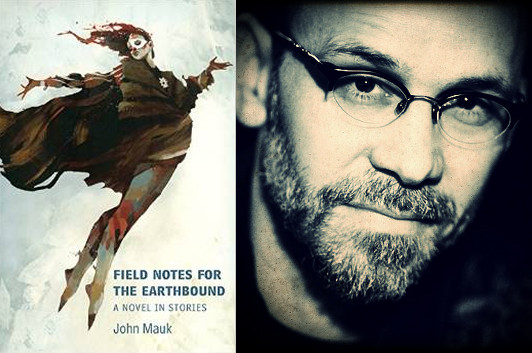John Mauk: The Urgency of Lee K. Abbott

photo: JohnMauk.com
The stories in John Mauk‘s Field Notes for the Earthbound are situated into an uncanny niche between realism and fantasy—a world where magic is folded into the ebb and flow of everyday life… until it bursts through to the surface. But not everything that’s weird in John Mauk’s corner of Ohio is supernatural, and those parts of the stories have an unsettling power as well. In this essay, Mauk discusses another short story writer whose voice compels him with each reading…
If I get waylaid or traffic jammed, I want something to study, something dense and alluring. So I carry a book nearly everywhere I go. For several months, that book has been All Things, All at Once, a panoramic collection of new and selected stories by Lee K. Abbott. All Things has been shoved in my backpack and crammed in various bags. It has slithered between couch cushions and ridden along like a family dog in the backseat of my Honda. My past ride-alongs include Close Range (Annie Proulx), Seven Nights (Jorges Luis Borges), One Hundred Years of Solitude (Gabriel Garcia Marquez), Cloud Street (Tim Winton), The Postmodern Explained (Jean Lyotard), and Negotiations (Gilles Deleuze), books that reshape the neurological and emotional landscape, that are worthy of a million reads. Abbott’s collection is that worthy. It’s full of stories that go hard and characters that yearn like crazy.
When it comes to fiction, I want to be tossed around, lulled, and then awakened by a bucket of something, anything. I want the most lush experience possible. I want a narrator to undo my thinking, to pull my teeth out. I want to go all gummy into the next sentence or page. Don’t get me wrong: I don’t want hijinks. I’m not a fan of narrative trickery. What I’m after is a narrator that sizzles or shimmers in some weird way—a voice that walks up to the line of propriety, looks both ways, and then steps over it.
And here’s the thing about Abbott’s narrators: they feel urgent—as though they’ve been lost in the desert for months, as if they’ve just wandered into town with nothing but clarity. They sound wild-eyed and prophetic, rambling in some beautiful desert tongue. They have so much stuff to report, and it’s all crucial. Every speck, recollection, and fussy qualifier matters. Consider this passage from “Revolutionaries,” in which the narrator recalls how an old friend went politically rogue:
“Toward the end—before the campus cops and four state policemen broke it up by dragging Jimmy off—he delivered a rambling singsongy declaration that mentioned Abe Maslow, Aldous Huxley, Carol Rogers, D.T. Suzuki—names that passed over me like clouds. They were the dead or the living, or the never-were. I wanted him to talk—if that’s all this was—about being afraid, about what dead William Wordsworth’s verses skills had to do with anything, and about what I was supposed to be doing in five or ten years. But he went on—“We’re discussing human worth here!”—his hair flyaway, his T-shirt too small and covered with buttons, his cheeks painted like an Apache’s, ignoring the hecklers who said he was queer, or chickenshit, or a commie.”
Or this passage from “What Y Was”:
“You’d want her as a neighbor, I’m sure. She can keep a confidence, for example. Or give you a lift to Walgreen’s if your car’s on the blink. Most of all, she’s got patience—maybe the way Midas had gold. Which probably explains why she stayed with this dipstick for so long. I could speculate, but I won’t. I’m about as good at guessing as a snake is driving a tractor. She must’ve known all along, though. About Bettie and Millie and whoever else there was to know about. Then something in her, the very her of her, went pop. Or snap. Or bang. Pick a noise, friends. That’s the sound of you going dry and cold inside.”
Such passages are dense balls of human gunk, micro-studies of what people are, what they become, what they do to themselves and others. And more importantly, for me, they show how far Abbott’s narrators go, how they writhe and grapple to make sense of things—all things. These narrators leap over propriety and syntactical temperance. They retrace, wonder aloud, smirk, and wince. They’re not dancing in front of the story, not drawing attention from the tale itself, but working like lunatics to make us believe it. And that is something to behold and to study.
29 November 2014 | selling shorts |

 Our Endless and Proper Work is my new book with Belt Publishing about starting (and sticking to) a productive writing practice.
Our Endless and Proper Work is my new book with Belt Publishing about starting (and sticking to) a productive writing practice. 
